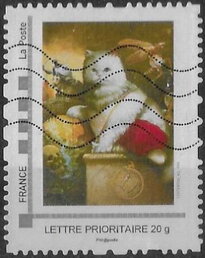Stamp: Painting of white cat on a pedestal (France 2022)
Painting of white cat on a pedestal (France 2022)
01 January (France ) within release Collector : Cat Paintings goes into circulation Stamp Painting of white cat on a pedestal face value Lettre No Face Value
| Stamp Painting of white cat on a pedestal in catalogues | |
|---|---|
| Colnect codes: | Col: FR-MON 2022-424/3 |
Stamp is square format.
Also in the issue Collector : Cat Paintings:
- Stamp - Painting of a Siamese cat with trumpet face value Lettre;
- Stamp - Painting of three cats wearing masonic aprons face value Lettre;
- Stamp - Painting of white cat on a pedestal face value Lettre;
- Stamp - Painting of white cat santa and reindeer face value Lettre;
- Stamp - Painting of white cat santa bearing gifts face value Lettre;
Stamp Painting of white cat on a pedestal it reflects the thematic directions:
The domestic cat (Latin: Felis catus) is a small, typically furry, carnivorous mammal. They are often called house cats when kept as indoor pets or simply cats when there is no need to distinguish them from other felids and felines. Cats are often valued by humans for companionship and for their ability to hunt vermin. There are more than 70 cat breeds, though different associations proclaim different numbers according to their standards.
Cats are similar in anatomy to the other felids, with a strong flexible body, quick reflexes, sharp retractable claws, and teeth adapted to killing small prey. Cat senses fit a crepuscular and predatory ecological niche. Cats can hear sounds too faint or too high in frequency for human ears, such as those made by mice and other small animals. They can see in near darkness. Like most other mammals, cats have poorer color vision and a better sense of smell than humans. Cats, despite being solitary hunters, are a social species and cat communication includes the use of a variety of vocalizations (mewing, purring, trilling, hissing, growling, and grunting), as well as cat pheromones and types of cat-specific body language.
Painting is the practice of applying paint, pigment, color or other medium to a solid surface (support base). The medium is commonly applied to the base with a brush, but other implements, such as knives, sponges, and airbrushes, can be used. Painting is a mode of creative expression, and the forms are numerous. Drawing, gesture (as in gestural painting), composition, narration (as in narrative art), or abstraction (as in abstract art), among other aesthetic modes, may serve to manifest the expressive and conceptual intention of the practitioner. Paintings can be naturalistic and representational (as in a still life or landscape painting), photographic, abstract, narrative, symbolistic (as in Symbolist art), emotive (as in Expressionism), or political in nature (as in Artivism). A portion of the history of painting in both Eastern and Western art is dominated by spiritual motifs and ideas. Examples of this kind of painting range from artwork depicting mythological figures on pottery, to Biblical scenes rendered on the interior walls and ceiling of the Sistine Chapel, to scenes from the life of Buddha or other images of Eastern religious origin. In art, the term painting describes both the act and the result of the action. The support for paintings includes such surfaces as walls, paper, canvas, wood, glass, lacquer, clay, leaf, copper and concrete, and the painting may incorporate multiple other materials including sand, clay, paper, plaster, gold leaf, as well as objects. The term painting is also used outside of art as a common trade among craftsmen and builders.


